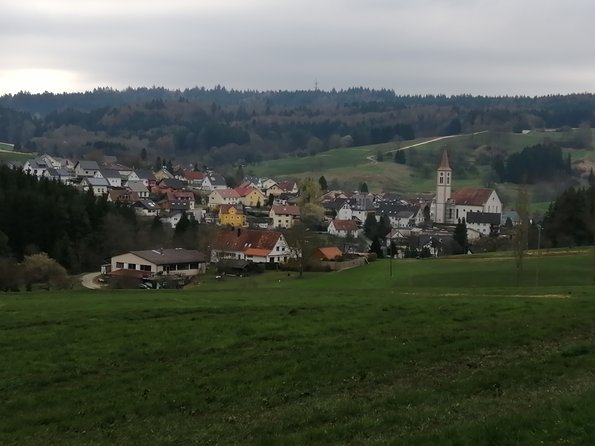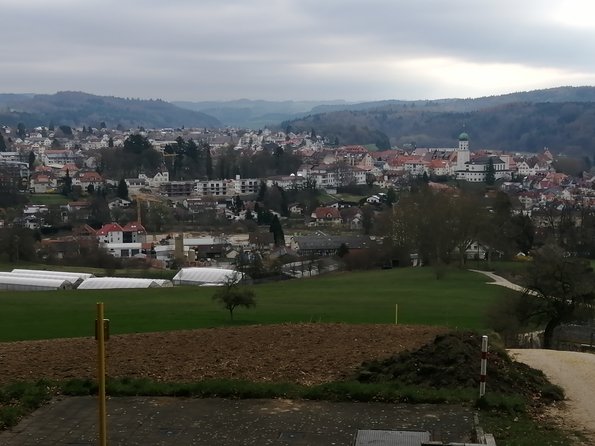Small town observations - everyday experiences in an extraordinary situation
by Anke W.*


cc. Anke W. lives in a village in southwest Germany. She describes the mostly positive interactions and observations she made during this extraordinary time of the Corona pandemic and comes to personal conclusions.
The community pulls together
The citizens of our town are pulling together. On our street, I asked all my neighbours over the age of 80, as well as those who are high risk due to chronic illness, whether I could run errands for them. It turned out that everyone is already taken care of by the adult children or other relatives. Nevertheless, everyone was appreciative regarding my offer to help. A family with several chronically ill members immediately offered to help me if I became ill.
A few years ago, I had a disagreement with an elderly lady from our street. Since then, the previously warm relationship between us had cooled down. When I approached her last week with the offer to help, the lady at first thanked me but declined my offer. When I asked her again before a shopping trip if she needed anything, we started chatting. She told me about her daughter and her son who came to visit regularly. She also inquired about my condition. She was also concerned about the situation of others who do not have adult children to visit them. In the end, she promised to call me in if she needed anything. But since she is home alone most of the time and the church events she has attended regularly now no longer take place, I decided to call her more often from now on and to take the time - at the recommended distance – to chat at her garden fence when she is in the garden. Why didn't I try earlier and more intensively to revive our neighbourly relations?
Yesterday I thought to myself that there might be others in the village who need help and wondered who might know about it. Before I had the opportunity to become active, an information letter, which was sent to all households in the village was in our mailbox today. Our village council organized a shopping service. Everyone who needs help and younger people who can offer support can get in touch with the mentioned contact addresses. Although my husband and I are no longer among the younger inhabitants of the village, I called one of the contact addresses to express my joy about this activity and to offer to run errands for others as part of my own purchases. This was happily received. At the same time, I was promised that I would also receive help if I needed it. It must be said that my husband and I moved from Cologne to our village twenty years ago. We have been involved in the beautiful village community for a long time, we have celebrated festivals together, helped neighbours before the Corona crisis and have also received help. However, this increased involvement with helping others touches me deeply.
Now my husband and I are also in the shopping service contact group. We received a carefully prepared letter explaining exactly what the supporters must consider in order not to jeopardise others and themselves, how to deal with payment for the purchases and with medical prescriptions. We also learned that similar initiatives are being set up in the surrounding villages.
Rural communities are organized and make it possible not to forget anyone. I am sure that this is also doable in urban areas, maybe under more difficult conditions. But even there, it is possible to help in a neighbourly way and not to leave anyone out.
Thoughtfulness in a small town
On Friday, 20 March 2020, shortly before noon, I need to go to the neighbouring town of about 10,000 inhabitants. I need to get a certificate from the doctor. There are not very many people on the main road. The sun is shining, it is warm, but the ice cream parlour is closed. Bakeries, butcher shops and pharmacies are open.
The few people are very considerate on the sidewalk. All pay attention to the others by keeping their distance of at least one and a half meters. Those walking by each other, also hold the distance. Where there isn’t enough room, people turn their heads slightly to the side as soon they pass each other. If the distance is large enough, almost all people answer my smile and greeting, with a lovely smile as well. Almost everybody seems appreciative of a positive human encounter. The responding smile is good for me; it warms me as much as the pleasant sun. Only one single boy, about 12 years old, doesn’t pay attention to his distance to others. However, he does not seem reckless. He just seems to be lost in his own thoughts.
When I look through the windows into the shops, I see that people don't get too close to the sales counters. They receive their goods with arms outstretched. In the short queue, they keep distance from each other. In the butcher shop one customer stands in the entrance door waiting their turn and to keep distance from the customer inside. When a customer wants to leave the shop, he steps aside and once again makes sure that there is enough distance. People seem worried but also seem calm.
In the doctor's office, the applicable safety precautions are posted at the entrance before entering. It is busy; however, all employees are still very courteous and friendly towards the patients. Without waiting, I can pick up the certificate that was pre-discussed and ordered by phone. We say goodbye with the words "Stay healthy".
Next, I drive to the so-called "lower town", where several big supermarkets and drugstores are located. The parking lots are full of cars. Nevertheless, the shops do not seem as crowded as they were a week ago. In the meantime, many people have probably built up reserves and avoid frequent trips into town.
The pretty fashion shop where my niece works has had almost no customers for two weeks. Starting tomorrow it will be completely closed. On the other hand, the neighbouring supermarket has been overcrowded in recent weeks.
I meet a friend in the fruit and vegetable department of the supermarket. We exchange a few words at an appropriate distance. Finally, she says she hopes to get yeast. The always attentive head of the fruit and vegetable department notices this and laughs "Good joke!" We agree that humour helps in every situation. My friend will use baking powder for baking. That is available now.
The shelves are stocked as well. Toilet paper and flour are available again in this store, but not in the usual quantity and variety. An employee sighs at the flour shelf. I address her from the appropriate distance. She says it is difficult for her to keep going. She must work quickly to restock the shelves (this was clearly visible). I thank her for her commitment and that she is "holding position". She is one of the current heroes. Thereupon she tells me that there are customers who complain that not everything is immediately available, that the restocking is taking too long and that she must speed up. The employee says that they receive goods every day, but not necessarily exactly what they order. I also tell her that the job that supermarket employees are doing is being praised in newspapers and on the Internet. She replies that she has no time to read it, but she is very happy about my comments. She then quickly gets back to work.
Most of the people I see in the aisles of the supermarket and at the checkout are considerate. Hardly anyone walks into the aisle without first looking whether someone is coming from the right or the left. If necessary, people wait and let others pass within the correct distance. In the aisle people don’t congregate in crowds. Everyone waits their turn.
At the checkout stands, customers stand in loose queues. Not everyone thinks of giving a little more distance. Many checkout stands are open so that customers can get through quickly.
At the customer service desk, in the entrance area of the supermarket, several people are queuing. Most of them keep the recommended distance. Two teenagers or young adults do not. They are kindly asked by an elderly gentleman for more distance. Thereupon the two young men say in a rather arrogant tone that this is pointless and that the flu is harmless. The older gentleman clearly asks them to be more considerate of others. Now the young men are keeping their distance before other people must intervene.
The two young men are welcome to their private opinion. However, if they are asked to be considerate of others, they cannot ignore it.
Finally, I stop by two discount stores to get an idea of the mood. Again, I only see considerate people. On the shelves for flour and toilet paper there are signs asking people to buy only in household quantities and to be considerate other customers. In one of the stores, there currently is no more flour on the shelves. In another discount store, a gentleman bought twenty kilos of flour. I wonder whether he and/or his wife use all the flour for baking or whether he is already participating in one of the initiatives where citizens shop for fellow citizens. After all, the latter would also be possible.
I quickly walk by the cashier and pack my purchased goods at a distance. The cashier tells me that some people are very ruthless at the checkout, arguing over milk cartons, and ask her to intervene. This is very strenuous.
I only noticed one situation today when someone reacted unkindly to another person. Apart from that, I experienced all people from their positive side. However, employees are currently working up to twelve hours a day. They are trained to respond to customer wishes. Therefore, satisfied customers are part of their everyday life. At present, however, there is no everyday life in the supermarkets. The staff is working under high pressure, but currently is still unable to provide everything what customers want. If a customer expresses his dissatisfaction to an employee, this increases the pressure on the sales staff considerably. This is not right and does not help at all. In order to prevent the few dissatisfied customers from becoming a dominant position, we should not take the “services” for granted as before, but rather express our gratitude more often. •
* Author known to the editors.